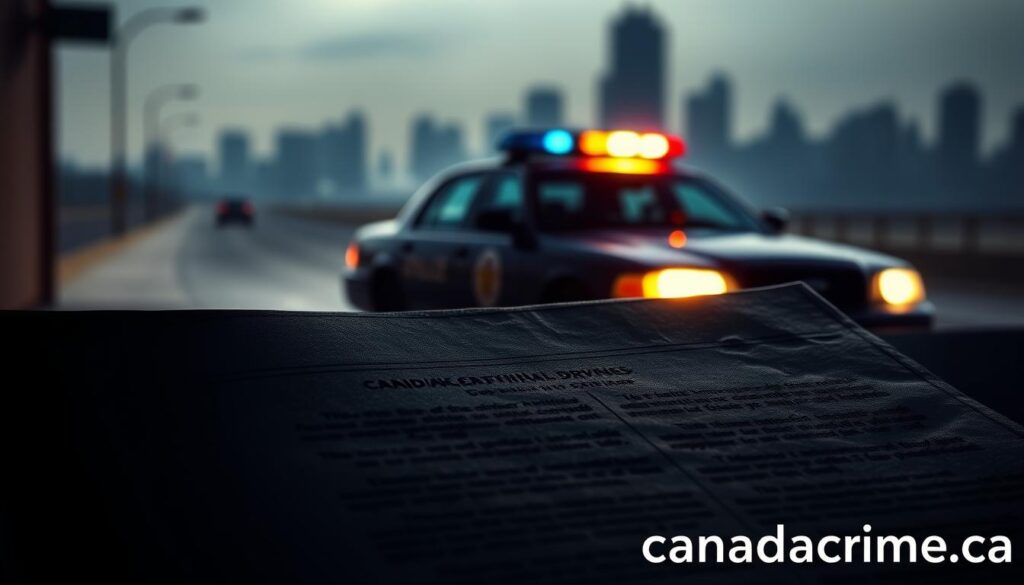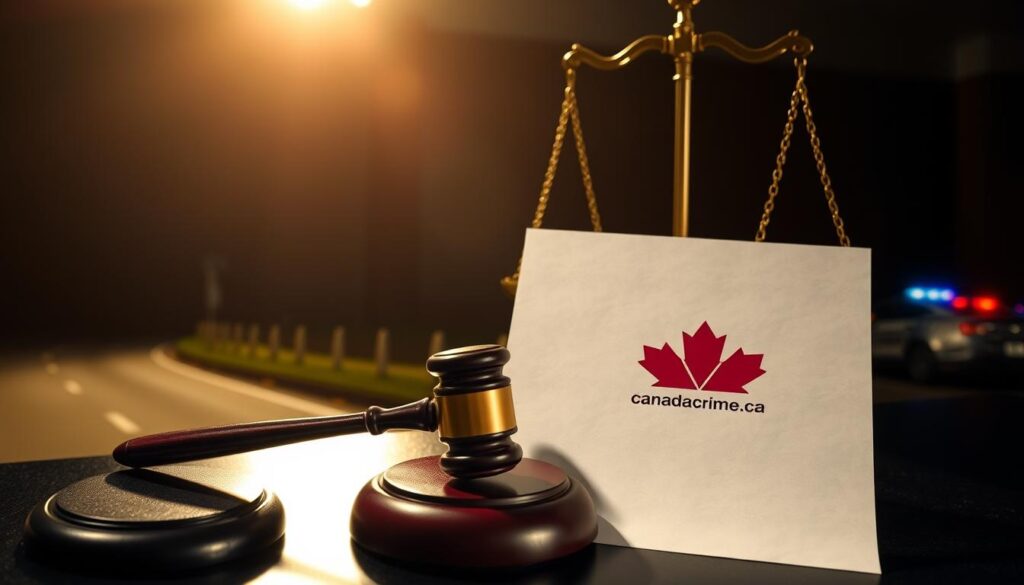Each year, over 69,000 Canadians face charges for driving under the influence. It’s the top criminal cause of death and injury nationwide. Nearly 3,500 cases involve drug-related impairment.
Knowing your legal rights on Canadian roads is crucial. Traffic safety laws are changing, especially with cannabis legalization and stricter enforcement. This guide covers the legal framework for responsible drivers.
We’ll cover testing procedures and your rights during police stops. You’ll learn about blood-alcohol and THC limits that define legal violations. This info is vital for dealing with law enforcement and understanding potential penalties.
Uninformed choices can affect your freedom, finances, and future opportunities. Stay informed to protect yourself on the road.
What Constitutes Impaired Driving in Canada
Impaired driving in Canada covers various behaviors regulated by federal law. The legal system takes a firm stance on driving under the influence. Understanding these rules is crucial to avoid serious legal consequences.
The Criminal Code prohibits driving while impaired by alcohol, drugs, or both. This applies to public roads, private property, and even boats or aircraft.
Legal Definition and Blood Alcohol Concentration Limits
Alcohol impairment is mainly measured through Blood Alcohol Concentration (BAC). The legal limit is 80 milligrams of alcohol per 100 milliliters of blood (0.08%). Driving at or above this level is a criminal offense.
You can face charges even with a BAC below 0.08%. If police prove your driving is impaired by alcohol, you may be charged with DUI (Driving Under the Influence).
Some provinces have extra penalties for BAC levels in the “warning range” (0.05% to 0.079%). These can include license suspension, vehicle impoundment, and mandatory education programs.
Drug Impairment Standards
Canada has set specific thresholds for drug impairment, especially for cannabis. For THC, the law uses a two-tiered approach.
Having 2-5 nanograms (ng) of THC per milliliter of blood is a less serious offense. It typically results in a fine. Having 5 ng or more is a more serious criminal offense.
The law also addresses combined impairment. Having 2.5 ng of THC with a BAC of 0.05% or higher is a separate criminal offense.
For drugs like cocaine and LSD, any detectable amount while driving can lead to charges. Police use field sobriety tests to identify drug impairment.
The Canadian Criminal Code on Impaired Driving
The Canadian Criminal Code is crucial for understanding impaired driving charges. It sets uniform standards for prosecutions across Canada. Provinces can add their own administrative penalties to these standards.
Canada’s approach to drunk driving has changed a lot over time. Recent reforms have made enforcement stronger and penalties harsher. These changes aim to reduce impaired driving incidents in Canada.
Section 320 Provisions
Section 320 of the Criminal Code outlines the main rules against impaired driving. It covers operating vehicles, vessels, aircraft, or railway equipment while impaired by alcohol or drugs.
You can be charged if your blood alcohol concentration (BAC) is 0.08% or higher. There are also limits for drug impairment. These include THC levels in blood for cannabis use.

Refusing a breath or blood sample test is also a crime. This refusal has the same legal consequences as being over the legal limit. Many drivers don’t realize this until it’s too late.
Penalties depend on the offense and number of convictions. They can include fines, driving bans, and jail time. Repeat offenders or cases causing harm face harsher punishments.
Recent Legislative Changes
Bill C-46, passed in June 2018, brought major changes to impaired driving laws. It updated and simplified the Criminal Code’s transportation rules.
A key change is mandatory alcohol screening. Police can now demand a breath sample from any driver they stop. This is a big shift in how they can enforce the law.
The new law also increased minimum fines and maximum penalties. First-time offenders face higher fines. Repeat offenders and cases causing injury have much harsher punishments.
Other changes include:
- Streamlined procedures for investigating and proving blood alcohol concentration
- Removal of defenses that encouraged risky behavior
- Clearer rules on information sharing in impaired driving cases
- New offenses for driving with certain drug levels in blood
These changes aim to deter impaired driving and improve detection. They also help reduce delays in the justice system. Canada remains committed to addressing the dangers of impaired driving.
Provincial and Territorial Impaired Driving Laws
Canada tackles impaired driving through federal criminal law and provincial regulations. The Criminal Code sets nationwide standards. Each province adds measures to deter impaired driving and boost road safety. This creates a comprehensive framework to reduce alcohol and drug-related incidents.
Driving rules differ across Canada. Provincial laws can impose immediate penalties before criminal charges. These often apply at lower blood alcohol levels than the federal 0.08% threshold.
Administrative Sanctions
Provinces use various administrative sanctions for suspected impaired driving. These preventive measures don’t need a criminal conviction. They rely on lower evidence thresholds.
Common sanctions include immediate license suspensions lasting 24 hours to 90 days. Many places also impound vehicles for 3 to 30 days.

You may need to complete education programs about impaired driving dangers. Repeat offenders often face ignition interlock requirements. These devices prevent driving if alcohol is detected.
Regional Variations in Enforcement
Enforcement approaches vary across Canada. British Columbia’s program is among the strictest. It allows 90-day suspensions and 30-day impoundments for high BAC or test refusal.
Ontario imposes 90-day suspensions and $198 penalties for criminal-range BAC. Alberta focuses on vehicle seizure, increasing impoundment for repeat offenders.
Quebec has zero tolerance for novice and commercial drivers. It imposes 90-day suspensions for any detectable alcohol. Many provinces penalize the “warn range” (0.05% to 0.079% BAC).
Know your local regulations. These laws determine immediate consequences if stopped for suspected impaired driving. Administrative sanctions often apply regardless of criminal charges.
Detection Methods Used by Law Enforcement
Canadian police use various tools to spot drivers impaired by alcohol or drugs. These methods have improved over time, becoming more precise and thorough. Knowing these procedures helps drivers understand their rights during traffic stops.
The legalization of cannabis and rising substance abuse concerns have led to enhanced detection techniques. Police now have more accurate ways to identify impaired drivers on the road.

Approved Screening Devices
Canadian law enforcement uses government-approved devices to screen for alcohol and drug impairment. Police can demand a breath sample from any driver they lawfully stop, even without suspicion.
Officers use portable breathalyzers to measure blood alcohol concentration (BAC). These provide quick results as preliminary screening tools. If BAC is near the legal limit, more precise tests follow at the station.
For drugs, police use oral fluid screeners to detect substances like THC, cocaine, and methamphetamine. These devices analyze saliva samples within minutes. Positive results may lead to further testing.
Standardized Field Sobriety Testing
When screening devices aren’t available, officers rely on Standardized Field Sobriety Testing (SFST). These tests check physical and cognitive functions typically impaired by alcohol or drugs.
SFST includes three main components. The horizontal gaze nystagmus test examines involuntary eye movements. The walk-and-turn test requires heel-to-toe steps along a line.
The one-leg stand test involves balancing on one foot while counting. Poor performance may lead to further testing or charges.
Drug Recognition Expert Evaluation
For suspected drug impairment, officers may call a Drug Recognition Expert (DRE). These specialists conduct a 12-step evaluation to determine drug-related impairment.
The DRE evaluation includes vital signs, eye exams, and muscle tone assessment. This thorough process typically takes 30-60 minutes to complete.
If impairment is suspected, the DRE may demand blood, urine, or oral fluid samples. Refusing these tests carries the same penalties as refusing a breathalyzer.
| Detection Method | Primary Target | Time Required | Evidence Strength | Refusal Consequences |
|---|---|---|---|---|
| Approved Breathalyzer | Alcohol | 2-5 minutes | Moderate | Criminal charge |
| Oral Fluid Screener | Cannabis, cocaine | 5-10 minutes | Low to moderate | Criminal charge |
| Field Sobriety Tests | All substances | 10-15 minutes | Moderate | Criminal charge |
| DRE Evaluation | All drugs | 30-60 minutes | High | Criminal charge |
Your Legal Rights During an Impaired Driving Stop
When police stop you for suspected impaired driving, your legal rights kick in. Officers can investigate, but you have protections under Canadian law. Knowing these rights helps you handle this stressful situation effectively.

Charter Rights Protection
The Canadian Charter of Rights and Freedoms safeguards you during impaired driving investigations. Section 8 protects you from unreasonable search and seizure. Police need legal grounds or your consent to search your vehicle.
Section 9 guards against arbitrary detention. Officers must have reasonable suspicion before stopping or detaining you. This doesn’t apply to routine traffic safety checkpoints.
Section 10 ensures your right to know why you’re detained. It also guarantees your right to legal counsel without delay. These protections form the basis of your rights during investigations.
Right to Legal Counsel
If arrested or detained, you have the right to speak with a lawyer immediately. Police must inform you of this right. They must let you contact a lawyer before further steps like breath or blood tests.
You can speak with your lawyer privately. If you don’t have one, free legal advice is available through duty counsel. This call is crucial for getting legal guidance before making important decisions.
Exercising your right to counsel doesn’t imply guilt. It’s a fundamental legal protection. However, this right doesn’t let you delay roadside screening tests indefinitely.
Lawful vs. Unlawful Police Demands
During a stop, police can lawfully ask for your license, registration, and insurance. They can require a roadside breath test if they suspect alcohol in your body.
A positive oral fluid drug test may lead to a blood sample demand. Refusing lawful demands for samples carries penalties similar to impaired driving.
Police can’t demand physical tests without explaining why. They can’t search your vehicle without grounds, consent, or a warrant. If you think a demand is unlawful, ask to speak with a lawyer first.
Immediate Consequences of Impaired Driving Charges
Impaired driving charges in Canada trigger immediate legal consequences. These penalties can affect your life, job, and mobility within hours. Understanding these consequences is vital for those facing DUI charges.
Vehicle Impoundment
Police can seize your vehicle immediately if you’re caught driving impaired. Impoundment periods vary by province, usually 3 to 30 days for first offenses. Repeat offenders face longer impoundments, up to 90 days in some provinces.
You’re responsible for all towing and storage fees. These costs can quickly add up to hundreds or thousands of dollars.

License Suspension
Administrative license suspensions start right after an impaired driving charge. These occur before your trial and last 24 hours to 90 days for first-timers. Suspensions create hardships, especially if you need to drive for work.
Many provinces require education programs and fees before returning your license. This adds to the already significant burden of a suspension.
Release Conditions and Bail
After arrest, you may be released with conditions or held for bail. First-time offenders often get released with a Promise to Appear. Conditions may include no driving, drinking, or visiting bars.
Serious cases might require a formal bail hearing. A judge then decides your release conditions. Bail conditions often depend on your blood alcohol concentration (BAC) levels.
Canada uses a tiered fine system based on BAC readings. First offenders with 80-119 mg/100 ml face a $1,000 fine. It’s $1,500 for 120-159 mg, and $2,000 for 160 mg or higher.
These legal consequences create hardship before trial. They serve as both punishment and deterrent. Understanding these penalties helps navigate the complex aftermath of a DUI charge.
Criminal Penalties for Impaired Driving Convictions
Canada’s Criminal Code sets strict penalties for impaired driving convictions. These penalties can severely impact your future. A conviction affects your freedom, finances, and mobility for years.
The legal consequences go beyond the courtroom. It’s vital to understand these penalties if you’re facing charges. Knowing the repercussions can help you avoid impaired driving.

Minimum and Maximum Sentences
The Criminal Code sets mandatory minimum penalties for drunk driving convictions. These penalties increase with repeated offenses. A first offense carries a minimum $1,000 fine.
Second offenses result in at least 30 days in jail. Third and subsequent offenses lead to a minimum of 120 days imprisonment. Courts can impose much harsher sentences than these minimums.
Impaired driving causing harm has severe consequences. If it causes bodily harm, you could face up to 14 years in prison. In death cases, the maximum penalty is life imprisonment.
“The severity of impaired driving penalties reflects Parliament’s recognition of the devastating harm this crime causes to Canadian families and communities each year.”
Aggravating Factors That Increase Penalties
Certain circumstances can lead to penalties above the mandatory minimums. High blood alcohol concentration (0.16% or higher) is a significant aggravating factor. It shows severe impairment.
Having passengers, especially children, in your vehicle while driving impaired is considered reckless. This behavior endangers vulnerable individuals and results in harsher sentencing.
Other factors increasing legal consequences include dangerous driving and fleeing from police. Causing an accident or having previous convictions may also influence sentencing.
Ignition Interlock Programs
Canadian law changes have modified the ignition interlock program. This program requires convicted drivers to install a breath-testing device. The device prevents the vehicle from starting if it detects alcohol.
Waiting periods for the program have been reduced. First-time offenders can now apply immediately. For second offenses, the wait time is now three months.
Subsequent drunk driving convictions allow application after six months. These programs offer limited driving privileges while ensuring public safety. Costs fall on the convicted driver.
A drunk driving conviction results in a permanent criminal record. This record impacts employment, housing applications, and international travel. It particularly affects travel to the United States.
Defending Against Impaired Driving Charges
Impaired driving charges require knowledge of defense options that can make a crucial difference. Canadian law offers ways to contest these allegations. Understanding these strategies can impact your case’s outcome and protect your rights.
Expert guidance is essential when facing impaired driving charges. A skilled lawyer can help navigate the complex legal landscape. They can work to preserve your driving privileges, reputation, and freedom.
Challenging the Evidence
Scrutinizing evidence is a key defense strategy. Breath and blood test results can be contested for various reasons. These include improper administration, equipment malfunction, or calibration issues.
Recent laws have changed what the Crown must disclose about testing equipment. Only “scientifically relevant” materials are now required. These include calibration check results and error messages from approved instruments.
- Calibration check results
- Error messages produced by the approved instrument
- Scientific data directly related to your specific test
Maintenance records may no longer be automatically available. This shift has led to new defense strategies. Lawyers now focus on other aspects of sobriety testing.

Procedural Defenses
Procedural defenses focus on potential violations of your Charter rights. These violations might make evidence inadmissible or lead to case dismissal. Common procedural defenses include challenging the legality of traffic stops.
Other defenses question if you were informed of your right to counsel. They may also identify unreasonable delays in testing or trial proceedings. Contesting search and seizure actions is another strategy.
- Challenging the legality of the initial traffic stop
- Questioning whether you were properly informed of your right to counsel
- Identifying unreasonable delays in administering tests or proceeding to trial
- Contesting the reasonableness of search and seizure actions
The protection of one’s Charter rights is not merely a technicality but the cornerstone of justice in impaired driving cases.
These defenses work well when law enforcement fails to follow proper protocols. They’re also effective when there are documented irregularities in case handling.
Working with a DUI Defense Lawyer
Experienced legal representation is crucial for impaired driving charges. A DUI defense lawyer brings vital knowledge to your case. They understand technical aspects and legal nuances that can be game-changers.
When choosing a lawyer, look for specific experience in impaired driving cases. Seek attorneys who know local court procedures and personnel. They should understand the science behind testing methods.
- Specific experience in impaired driving cases
- Knowledge of local court procedures and personnel
- Understanding of scientific principles behind testing methods
- Track record of successful defenses or favorable plea negotiations
Your first meeting should cover your arrest details thoroughly. Discuss any victim support needs if an accident occurred. Review potential defense strategies tailored to your situation.
Defense approaches vary for first offenses versus repeat convictions. Accidents with injuries need specialized strategies. These may include addressing victim support programs as part of the resolution.
Early lawyer intervention can preserve evidence and identify procedural errors. It may lead to reduced charges or penalties, even in seemingly clear-cut cases.
Long-Term Impact of an Impaired Driving Conviction
An impaired driving conviction creates long-term challenges that many Canadians don’t expect. The lasting consequences can affect your life for years or even decades. These impacts touch nearly every aspect of your personal and professional life.

Criminal Record Implications
An impaired driving conviction results in a permanent criminal record. This record can limit your future opportunities. It becomes visible on background checks, potentially closing doors to employment.
Many employers see a DUI conviction as a sign of poor judgment. This is especially true for jobs requiring driving or working with vulnerable people. Professional licenses may also be at risk.
You can apply for a record suspension after completing your sentence. This process is lengthy and doesn’t guarantee approval. It also doesn’t erase your record from all databases.
Insurance Premium Increases
The financial impact of an impaired driving conviction goes beyond court-imposed fines. Insurance companies see DUI offenders as high-risk drivers. This results in premium increases that can last for years.
After a conviction, your auto insurance rates may increase by 100% to 400%. This can cost you thousands more dollars annually for up to six years. Some insurers may refuse coverage, forcing you to seek high-risk insurance.
These increased costs are a significant long-term financial burden. Using preventive measures like designated drivers is far more economical than facing these consequences.
Border Crossing and International Travel Restrictions
An impaired driving conviction can restrict your ability to travel internationally. The U.S. considers DUI a crime of “moral turpitude” under their immigration laws. This can result in border entry denial.
Canadian travelers with DUI convictions may be turned away at U.S. borders without warning. This affects both personal travel and professional opportunities requiring international mobility.
To enter the U.S. with a DUI record, you may need a waiver of inadmissibility. This complex process requires renewal every 1-5 years. Other countries may have similar restrictions.
| Long-Term Consequence | Duration | Potential Impact | Possible Solutions |
|---|---|---|---|
| Criminal Record | Permanent (until record suspension) | Employment limitations, housing restrictions, social stigma | Apply for record suspension after 5-10 years |
| Insurance Increases | 6+ years | $2,000-$10,000 additional cost annually | Defensive driving courses, maintaining clean record |
| Travel Restrictions | Potentially lifetime | Denied entry to U.S. and other countries | Apply for temporary entry waivers |
| Repeat Offense Penalties | Escalating with each offense | 30 days imprisonment (2nd offense), 120 days (3rd offense) | Substance abuse treatment, ignition interlock devices |
The consequences get worse with repeat offenses. A second conviction can result in 30 days imprisonment. A third offense carries a minimum 120-day jail sentence. Cases with higher THC levels can lead to greater penalties.
These long-lasting impacts show why understanding types of crimes in Canada is crucial. The effects of an impaired driving conviction often outweigh the immediate penalties. This makes prevention and legal defense equally important.
Conclusion
Impaired driving is a leading preventable cause of death and injury in Canada. Driving under the influence risks your future and the lives of others on the road. The legal system treats these offenses severely.
Canadian law prohibits driving with high levels of alcohol, THC, or other drugs. First-time offenders face fines of $1,000 or more. Penalties increase dramatically for repeat offenses.
Understanding your rights is crucial if you’re facing charges. Knowing when to request legal counsel can significantly impact your case outcome.
Victim support services exist across Canada for those affected by impaired drivers. These organizations provide counseling, court accompaniment, and help with compensation claims. MADD Canada offers resources for families coping with losses.
Prevention is the best strategy. Plan alternative transportation before drinking begins. Use rideshare services, designate a sober driver, or stay overnight. These choices prevent life-altering consequences.
If you struggle with substance use, contact addiction services in your province. Addressing underlying issues protects you and your community from impaired driving’s effects.
By making responsible choices and supporting enforcement, you help create safer Canadian roads for everyone.
FAQ
What is the legal blood alcohol concentration (BAC) limit in Canada?
What are the legal limits for cannabis impairment while driving?
Can I refuse to take a breathalyzer test if stopped by police?
What are my rights if I’m pulled over for suspected impaired driving?
What happens to my vehicle if I’m charged with impaired driving?
Will my license be suspended immediately if I’m charged with impaired driving?
What are the minimum penalties for a first-time impaired driving conviction?
FAQ
What is the legal blood alcohol concentration (BAC) limit in Canada?
Canada’s legal BAC limit is 0.08%. Some provinces have penalties starting at 0.05%. Exceeding 0.08% is a criminal offense under Canadian law.
What are the legal limits for cannabis impairment while driving?
Canada uses a two-tier approach for THC limits. 2-5 nanograms per milliliter is a less serious offense. 5+ nanograms is a more serious criminal offense.
Combined alcohol and cannabis use is also criminal. This includes 2.5+ nanograms of THC with 0.05%+ BAC.
Can I refuse to take a breathalyzer test if stopped by police?
Refusing a breath sample is a criminal offense. It carries penalties equal to impaired driving. Police can demand samples from any lawfully stopped driver.
What are my rights if I’m pulled over for suspected impaired driving?
You have the right to know why you’re detained. You can speak with a lawyer as soon as possible. You’re protected against unreasonable search and seizure.
However, you must comply with lawful demands for breath or fluid samples.
What happens to my vehicle if I’m charged with impaired driving?
Your vehicle may be impounded for 3 to 30 days. This depends on your province and if it’s a repeat offense. You’re responsible for towing and storage costs.
Will my license be suspended immediately if I’m charged with impaired driving?
Yes, administrative suspensions occur immediately upon being charged. They can last from 24 hours to 90 days or longer. This is separate from criminal penalties after conviction.
What are the minimum penalties for a first-time impaired driving conviction?
First offense penalties include a
FAQ
What is the legal blood alcohol concentration (BAC) limit in Canada?
Canada’s legal BAC limit is 0.08%. Some provinces have penalties starting at 0.05%. Exceeding 0.08% is a criminal offense under Canadian law.
What are the legal limits for cannabis impairment while driving?
Canada uses a two-tier approach for THC limits. 2-5 nanograms per milliliter is a less serious offense. 5+ nanograms is a more serious criminal offense.
Combined alcohol and cannabis use is also criminal. This includes 2.5+ nanograms of THC with 0.05%+ BAC.
Can I refuse to take a breathalyzer test if stopped by police?
Refusing a breath sample is a criminal offense. It carries penalties equal to impaired driving. Police can demand samples from any lawfully stopped driver.
What are my rights if I’m pulled over for suspected impaired driving?
You have the right to know why you’re detained. You can speak with a lawyer as soon as possible. You’re protected against unreasonable search and seizure.
However, you must comply with lawful demands for breath or fluid samples.
What happens to my vehicle if I’m charged with impaired driving?
Your vehicle may be impounded for 3 to 30 days. This depends on your province and if it’s a repeat offense. You’re responsible for towing and storage costs.
Will my license be suspended immediately if I’m charged with impaired driving?
Yes, administrative suspensions occur immediately upon being charged. They can last from 24 hours to 90 days or longer. This is separate from criminal penalties after conviction.
What are the minimum penalties for a first-time impaired driving conviction?
First offense penalties include a $1,000 fine and one-year driving ban. The fine increases for higher BAC readings. Refusing testing results in a $2,000 fine.
How do impaired driving laws differ across Canadian provinces?
The Criminal Code sets federal standards. Provinces have additional sanctions that vary significantly. These include different thresholds, impoundment lengths, and interlock program requirements.
What is an ignition interlock device and when is it required?
An ignition interlock is a breathalyzer in your vehicle. It prevents operation if alcohol is detected. It’s mandatory for repeat offenders and sometimes for first-time offenders.
How can I challenge the results of a breathalyzer or drug test?
You can question test reliability, device calibration, officer qualifications, or procedural errors. Recent laws limit disclosure requirements, making challenges more difficult.
How long will an impaired driving conviction affect my insurance rates?
A conviction typically increases insurance premiums for at least 6 years. Rates often double or triple. Some companies may refuse coverage, forcing you to seek high-risk insurance.
Can I travel to the United States with a Canadian impaired driving conviction?
A DUI conviction can make you inadmissible to the U.S. You may need to apply for a waiver. This isn’t guaranteed and requires periodic renewal if granted.
What is the difference between Standardized Field Sobriety Testing and Drug Recognition Expert evaluation?
SFST includes three roadside tests to detect impairment. A DRE evaluation is a 12-step process by trained officers. It determines specific drug impairment and may include physical exams and fluid samples.
How soon can I apply for a record suspension (pardon) after an impaired driving conviction?
You must wait 5 years for summary convictions. For indictable offenses, the wait is 10 years. This starts after completing all sentence aspects.
What additional penalties apply if I cause an accident while driving impaired?
Causing bodily harm while impaired can result in 14 years imprisonment. Causing death carries a maximum life sentence. These offenses have longer driving bans and severe consequences.
Are there special considerations if I need to drive for work after an impaired driving conviction?
Some provinces offer restricted license programs for work driving. These typically require an ignition interlock device. They have strict limitations on when and where you can drive.
,000 fine and one-year driving ban. The fine increases for higher BAC readings. Refusing testing results in a ,000 fine.
How do impaired driving laws differ across Canadian provinces?
The Criminal Code sets federal standards. Provinces have additional sanctions that vary significantly. These include different thresholds, impoundment lengths, and interlock program requirements.
What is an ignition interlock device and when is it required?
An ignition interlock is a breathalyzer in your vehicle. It prevents operation if alcohol is detected. It’s mandatory for repeat offenders and sometimes for first-time offenders.
How can I challenge the results of a breathalyzer or drug test?
You can question test reliability, device calibration, officer qualifications, or procedural errors. Recent laws limit disclosure requirements, making challenges more difficult.
How long will an impaired driving conviction affect my insurance rates?
A conviction typically increases insurance premiums for at least 6 years. Rates often double or triple. Some companies may refuse coverage, forcing you to seek high-risk insurance.
Can I travel to the United States with a Canadian impaired driving conviction?
A DUI conviction can make you inadmissible to the U.S. You may need to apply for a waiver. This isn’t guaranteed and requires periodic renewal if granted.
What is the difference between Standardized Field Sobriety Testing and Drug Recognition Expert evaluation?
SFST includes three roadside tests to detect impairment. A DRE evaluation is a 12-step process by trained officers. It determines specific drug impairment and may include physical exams and fluid samples.
How soon can I apply for a record suspension (pardon) after an impaired driving conviction?
You must wait 5 years for summary convictions. For indictable offenses, the wait is 10 years. This starts after completing all sentence aspects.
What additional penalties apply if I cause an accident while driving impaired?
Causing bodily harm while impaired can result in 14 years imprisonment. Causing death carries a maximum life sentence. These offenses have longer driving bans and severe consequences.
Are there special considerations if I need to drive for work after an impaired driving conviction?
Some provinces offer restricted license programs for work driving. These typically require an ignition interlock device. They have strict limitations on when and where you can drive.

